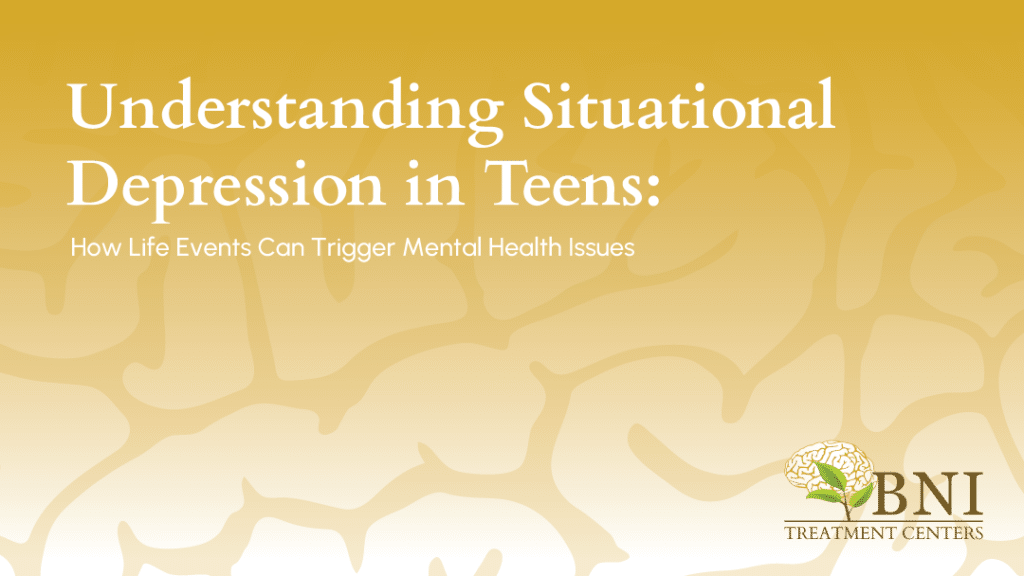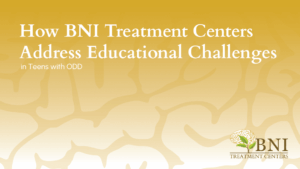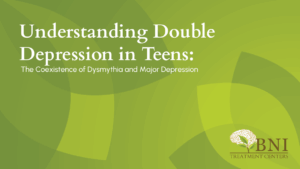
Seeing your teen depressed is one of the most challenging situations a parent could face. However, it happens to many adolescents across the country. In 2021, over 20% of adolescents reported having a major depressive episode in the U.S.
BNI Treatment Centers understands the profound impact depression can have on teens. Understanding situational depression is essential for parents to intervene early. In this discussion, we’ll explore the causes of situational depression in teens and how you can support your child through it.
Understanding Situational Depression in Teens: A Contextual Overview
Situational depression is a response to stress or a change in the teen’s environment. Adolescents encounter various stressors in life, which can precipitate situational depression. Understanding situational depression in teens requires a multidimensional approach that considers the complex combination of emotional, cognitive, and social influences.
Exploring the Underlying Causes of Situational Depression in Adolescents
The causes of situational depression in adolescents are multifaceted, encompassing a range of psychosocial and environmental factors. Let’s explore these further.
Stress Within the Family
One of the most significant contributors is familial stress, particularly in cases of parental divorce, which evokes fears of disruption and concerns about custodial arrangements. Financial strain further exacerbates emotional distress by limiting access to essential resources such as food and clothing, undermining security and stability. These challenges contribute to feelings of helplessness and sadness.
Academic Performance and Peer Relations
Academic performance is a significant factor in the development of situational depression among adolescents. Many students experience considerable stress due to high academic expectations, competitive school environments, and the fear of failure. When adolescents face external stressors unrelated to academics, their academic performance declines due to their emotional distress. Furthermore, peer acceptance is often closely tied to academic success, with students who maintain strong peer relationships demonstrating higher academic achievement. Adolescents who are having difficulties with poor academic performance also experience negative social interactions, exacerbating feelings of isolation and worsening situational depression.
Loss or Suicide
The loss of a friend or loved one is a significant precipitant of situational depression in adolescents. Research indicates that 78% of adolescents experience the loss of a relative or friend before the age of 18, with approximately 1 in 20 losing someone to suicide each year. While grief of any kind can contribute to the development of depression, studies suggest that adolescents who experience a loss due to suicide face greater difficulty in processing their emotions. They face feelings of shock, sadness, and self-blame, frequently grappling with unanswered questions about the loss. These intense emotions can be pervasive, and if left unaddressed, situational depression may evolve into a more chronic depressive disorder over time.
Identifying Key Indicators of Situational Depression in Teenagers
Situational depression symptoms are similar to those of a depressive disorder, though they tend to dissipate as the situation improves or resolves. Key indicators that your teen is experiencing depression include:
- Persistent feelings of sadness, worthlessness, or guilt
- Changes in academic performance, such as poor grades or missing classes
- Sleep disturbances
- Appetite and weight changes
- Changes in friend groups or avoiding social interaction altogether
- Losing interest in hobbies and activities
- Unexplainable aches and pains
- Headaches
- Digestive issues such as cramps, nausea, and diarrhea
Recognizing these symptoms in adolescents underscores the need for timely intervention. Engaging in open conversations about recent life changes, particularly those related to school, relocation, or familial transitions such as divorce, is essential in providing emotional support.
Strategies for Supporting Adolescents Coping with Situational Depression
Effective intervention strategies for situational depression focus on emotional support, coping skill development, and professional guidance as needed. Open communication is the fundamental aspect of support, as allowing adolescents to express their feelings without fear of judgment promotes emotional healing. When talking to your teen, actively listen and validate your teen’s experiences to create a sense of safety and understanding.
Encouraging healthy coping mechanisms, such as physical activity, mindfulness practices, and creative outlets, can help adolescents manage their emotions. Establishing a structured routine, setting realistic goals, and promoting social interactions can further support emotional stability. In cases where situational depression significantly impacts daily functioning, seeking professional counseling or therapy may be beneficial. Therapy methods such as cognitive behavioral and dialectical behavioral are standard for treating situational depression as they work to develop coping strategies and reframe negative thought patterns.
Situational Depression Treatment for Teens in California
Situational depression may seem like it will go away or get better on its own, but the truth of the matter is it can be debilitating for your teen. Seeing the progression of decline is heartbreaking, but there are ways you can help your teen get back on track. Teen depression treatment will open the door to healing and build up your teen’s strength and resilience.
Help for situational depression is available for your teen today. BNI Treatment Centers provides quality mental health care for adolescents backed by our psychiatrist-led team of experts. You will be a part of your teen’s treatment path every step of the way. Call us today at (888) 522-1504 to learn more about our program offerings.
BNI Treatment Centers: Science-based, evidence-backed, compassion-led.




